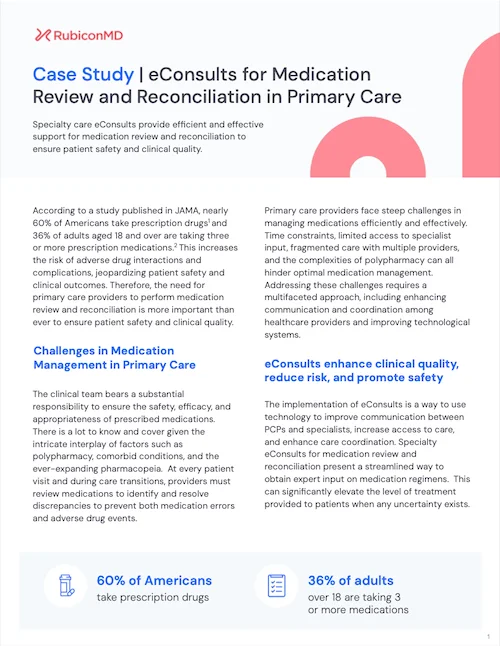Building eConsult Programs Aligned to Quality Initiatives for More Effective Value-Based Care
As primary care providers and health systems transition from traditional fee-for-service models to value-based care (VBC), eConsults are a scalable,…
More than one in four adult Americans has a disability, encompassing cognitive, mobility, hearing, vision, independent living, or self-care challenges. Beyond management of their disability, individuals with disabilities face higher risks of chronic health conditions including obesity, heart disease, diabetes, and smoking-related complications.1 Consequently, consistent access to specialized healthcare is critical. However, traditional healthcare settings often present barriers that disproportionately impact people with disabilities, from physical access limitations to communication challenges and logistical hurdles.
eConsults bridge these gaps by empowering primary care providers (PCPs) to advocate for their patients and offer timely specialty care without the burden of additional in-person office visits.
Adults with disabilities are nearly twice as likely to report unmet healthcare needs due to accessibility challenges at doctors’ offices. Traditional clinical settings are often unequipped with the diverse assistive technologies that many individuals with disabilities rely on. Mobility aids, communication devices, and other adaptive tools may not be supported, or may be challenging to use effectively in busy, fast-paced clinics.
For many, in-person specialist appointments present significant challenges, such as:
Coordinating appointments with specialists often demands navigating limited availability and working around personal care schedules. Long waiting room times and crowded spaces can be particularly challenging for individuals with conditions that exacerbate chronic fatigue or pain, such as fibromyalgia or arthritis.
Transportation to appointments can be costly and require complex logistics. Many rely on physical assistance, adaptive transportation, accessible vehicles, and assistance from caregivers, making even routine healthcare visits a considerable burden. Moreover, physical accessibility at healthcare facilities remains inconsistent: limited parking, inaccessible entrances, and inadequately designed waiting areas and exam rooms can all create additional obstacles.
A U.S. survey of physicians from seven specialties revealed that, among those treating patients with significant mobility limitations, only 40% consistently use accessible exam tables or chairs. Inaccessible equipment—including exam tables, weight scales, infusion chairs, mammography machines, and radiology devices—can negatively impact patients’ treatment, safety, and overall quality of care.
Even when accessible equipment is available, patients with disabilities may still face disparities caused by a lack of awareness around accommodations, restrictive office policies, and physician biases.2 Patients with cognitive disabilities may struggle to navigate complex healthcare systems, process unfamiliar environments, or communicate effectively with specialists. For individuals with vision or hearing impairments, communication barriers or inaccessible medical information can further compound these challenges, leading to frustration and missed opportunities for care.
Primary care teams can play a critical role in addressing specialty care access gaps for patients with disabilities. By reducing unneeded referrals, eConsults eliminate in-person appointment challenges for people with disabilities. Some of the most significant benefits include:
Patients can receive expert input through their trusted PCP, eliminating unnecessary referrals and delays. This ensures that care is coordinated and tailored to their specific needs.
eConsults empower PCPs to advocate for their patients more effectively. They can collaborate with specialists to address complex health concerns while maintaining an understanding of the patient’s broader needs, ensuring a more holistic approach to care.
For patients sensitive to overstimulation or prone to chronic pain or fatigue, avoiding crowded waiting rooms and lengthy office visits improves the overall healthcare experience.
People with disabilities are less likely to receive preventative services like cancer screenings or diagnostic imaging. eConsults encourage timely interventions that can lead to improved long-term outcomes.
eConsults reduce the amount of time patients spend at doctor’s offices. This reduces challenges associated with both transportation to appointments and inaccessible healthcare facilities, including parking lots, waiting rooms and exams rooms.
By enabling PCPs to manage a broader scope of care, eConsults decrease the need for individuals with vision, hearing, or cognitive impairments to navigate unfamiliar environments that may lack necessary accommodations, such as sign language interpreters, adaptive communication tools, or other assistive devices.
PCP seeks medication management guidance for 50-year old female experiencing migraine worsening in frequency and duration.
PCP asks for specialist’s recommendation regarding the efficacy of aquatic therapy for a paraplegic patient with osteoporosis.
PCP requests medication dosing for 65-year old female with seizure disorder and balance issues.
eConsults hold transformative potential for improving healthcare access and outcomes for individuals with disabilities. By increasing flexibility and reducing the need for in-person appointments, eConsults make healthcare more adaptable, foster improved continuity of care, and facilitate better health outcomes. Embracing these innovations marks an important step toward healthcare that serves the diverse needs of people with disabilities.
As primary care providers and health systems transition from traditional fee-for-service models to value-based care (VBC), eConsults are a scalable,…
Access to specialty care shouldn’t depend on your zip code, insurance type, or income level—but for Medicaid patients, it often…
In recent years, eConsults have emerged as an impactful tool for health plans to increase value and lower specialty care…

Explore real examples of specialty care eConsults providing efficient and effective support for medication review and reconciliation.